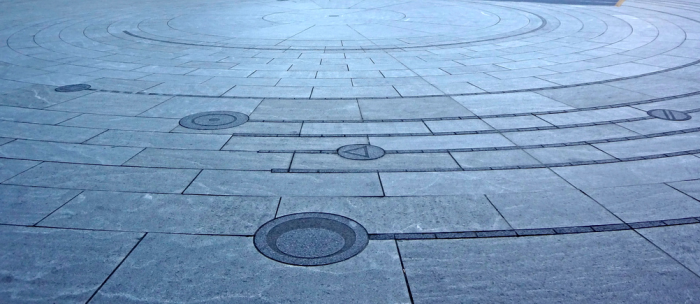For a spiritual seeker, every discipline is a new lens through which to examine ourselves.
And, though many people consider these things mutually exclusive, it’s when we pair the mystic with the material, the scientific with the preternatural, that we best understand the world and our place in it.
Astronomy and astrology, for example, are not contradictory disciplines: they are two sides of the same coin. Astronomy is a tool we use to understand the world; astrology is a tool we use to understand ourselves.
Astrology stands apart in its ability to provide insight into our past, present, and future. If we know what to look for, astrology can expose our soul’s DNA and empower us to take our destiny into our hands.
And, speaking of destiny, what implications does astrology have for free will?
It might surprise you to learn that this predictive study actually confirms our free will. Our astrological blueprint (also called a natal chart), is like our spiritual DNA. Though we are born with certain things encoded in our DNA—our lives, experiences, and attitudes all influence the expression of this inherited structure.
Astrology shows us what kind of energy we were born with (usually thought of as the soul’s agreement—what our soul said “yes” to working with in this lifetime).
Understanding this agreement allows us to look back on childhood, family dynamics, and inherited circumstances, and realize one inevitable truth: that everything was exactly as it needed to be to optimize our growth and bring us to where we are today.
Astrology through the ages
For thousands of years, astrologers were consulted by kings, emperors, and the higher echelons of society.
They knew the movement of the planets and used that knowledge to predict the outcomes of elections, to help plan battle strategy, and to keep society in harmony by tracking the the timing of planting and harvesting, as well as religious observances and feast days.
Prior to the 17th century, the movement of the heavens was considered the movement of the divine. Astrology was a system through which man could attempt to commune and better align with the the supernatural.
But during the Enlightenment, a schism formed—spirit was made separate from matter, church from state—alchemy became chemistry, and astronomy became favored over astrology for its scientific viewpoint.
Still today, public figures and respected leaders consult astrologists.
Nancy Reagan sought insight regarding the impact of astrological portents on her husband’s safety; Princess Diana was a lifelong devotee of the subject, even becoming very close friends with her personal astrologer, Debbie Frank.
So, throughout history, many of the people we admire have considered reading the stars an integral part of their arsenal.
But does it work? And, if so, how?
The nuts and bolts of astrology
The subjective nature of astrology is something we have to come to terms with. Like psychology, astrology uses clues and indicators from our past and from our behavior to help identify and predict urges and patterns in the human psyche.
It’s a soft science. But this description has always helped me understand the relationship between the stars and ourselves.
Each planet can be thought of as a hand on a clock. When we look at a clock, the hands tell us the time. It’s three o’clock when the big hand points up, and the little hand points to the right. The hands themselves aren’t time—they are indicators of time.
In the same way, through careful observation, astrologers throughout history have charted the force and direction of energy exerted on a planet, person, or group of people based on the position of the planets. This is where the birth chart comes in.
What is a natal chart and what can it tell us about ourselves?
A natal chart is a snapshot of the sky at the moment we were born. In essence, the moment of our first breath is when we come into accord with the energies of the universe.
Those relationships remain fixed throughout our lifetime. Our natal chart gives clues to major life lessons, personality traits, and hidden desires, and points the way to our soul’s purpose through three key indicators: our sun sign, moon sign, and rising sign.
How do you plot your chart?
Anyone can create a natal chart. The easiest (free) way on my radar is through Astro Dienst.
Here’s what you’ll need:
- Birth date
- Birthplace
- Birth time (to the minute)
This should all be on your birth certificate. This information needs to be as accurate as possible (the difference of a few degrees in latitude or a few minutes of time can make all the difference in our natal chart).
If you can’t get this information quickly, it might be fun to look up the natal chart of a friend, family member, or partner, in the meantime (with their permission, of course). It’ll give you tremendous insight into their character and enhance your relationship in myriad ways.
Once you have that information, navigate to this page. You’ll be given the option to create a user profile, but it’s not required to complete your chart. You can just click where it says “for guest users” and the fields where you’ll enter your birthplace, date, and time will magically populate.
What your sun, moon, and rising signs say about you
Sun sign. We’ve all been asked, “What’s your sign?” by someone trying to get to know (or act like they’re trying to get to know) us. But it’s based on the fallacy that the sun sign paints a full picture of someone’s character and tendencies.
It’s one small piece of the much larger puzzle that is the human psyche.
The sun sign is essentially the face we show to the world. Our sun sign is made up of qualities that others might use to describe us, like, “outgoing,” “addicted to travel,” or “highly organized.” But we as individuals know how little of our true identity is seen or understood by the people around us.
Moon sign. If our sun sign is our face to the world, the moon is its complement. While the sun represents our ego, the moon represents our unconscious drives and emotions.
The moon reflects our core beliefs about ourselves. These elements, hidden in the shadow, arise as reactions, emotions, and triggers.
Without the insight that the moon gives us, we can never know ourselves completely. For example, a Cancer moon may be overly sensitive and react to wounding by withdrawing, whereas a Scorpio moon hides its wounds by lashing out. When we implement the insights we gain from understanding our moon sign, we are more content, flexible, and open.
The moon gives us access to a deeper level of consciousness and to the joy that comes when we live in accordance with our true nature.
Rising sign (or the ascendant). The rising sign is not a planet, but a marker. If you look at your chart, you’ll see a black horizontal line that indicates the horizon line. If you follow that line from the center of the chart to the left, that is your ascendant.
The sign this line is tied to is your rising sign. This is essentially the moment in your astrological blueprint that night turns to day—that darkness turns to light. It is a tipping point for the psyche.
As we now know, the sun sign is the ego, which is just one (albeit one compelling) part of the conscious mind. Sometimes it is so strong, we lose awareness of who we really are.
But in other moments, greater wisdom steps in—for example, when we authentically express ourselves without self-consciousness.
When that happens, we can thank our rising sign. It’s a part of us the don’t always share with the world (we’re not always in touch with it ourselves), but the part our friends recognize and remind us of when we doubt ourselves.
When we step out of the light of our ascendant, we become unnecessarily fearful; we cling to our smallness, becoming defensive. But when we step into that light, we embody the fullest expression of ourselves, as encoded in our natal chart.
This is how we can know unequivocally who we are—the only way we can establish an unshakable sense of self.
~












Read 0 comments and reply